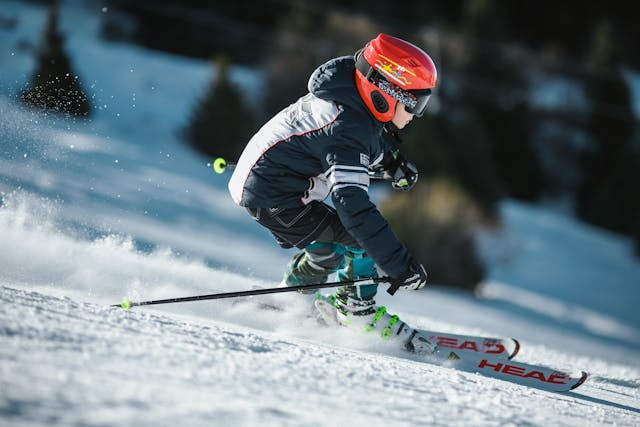When it comes to hitting the slopes, there are two options: skiing or snowboarding. Both provide exciting experiences and opportunities to enjoy nature, but each has its own set of advantages and disadvantages. In this post, we will look at the differences between skiing and snowboarding, as well as the benefits and drawbacks of each, to help you determine which is best for you.
Skiing
Pros of Skiing
Accessibility: Skiing is frequently thought to be easier to learn for beginners because the movements are more natural and intuitive for most individuals. This makes it an excellent choice for people who are new to winter sports or want a fun method to stay active during the colder months. If you are new to skiing, there are so many ski schools for beginners who help you to learn skiing techniques from basic to advanced.
Versatility: Skiers can handle a wide range of terrain, including groomed routes and backcountry slopes. This mobility allows for unlimited exploration, keeping the sport fascinating for both novice and experienced skiers.
Speed: Skiing provides faster speeds than snowboarding, making it an exciting option for adrenaline addicts. The feeling of carving down a mountain at high speeds is unbeatable for many skiers, and it’s a major draw for those who love the rush of speed.
Ski resorts: Many of the world’s best ski resorts are particularly constructed for skiers, with a variety of terrain, amenities, and services tailored to their needs. From Whistler Blackcomb in Canada to Zermatt in Switzerland, there are plenty of fantastic places to explore on skis.
Cons of Skiing
Learning curve: While skiing may be easier to learn for certain beginners, mastering the sport will require time and effort. The initial learning curve can be high, and beginners frequently struggle with balance and coordination when they first start out.
Equipment: Skiing requires more equipment than snowboarding, such as skis, boots, poles, and bindings. This can increase the cost of getting started, particularly for individuals on a tight budget.
Injury risk: Skiing carries a higher risk of certain types of injuries, particularly knee injuries and fractures. While proper technique and safety equipment can help reduce the risk, accidents can still happen, especially at high speeds or on challenging terrain.

Snowboarding
Pros of Snowboarding
Cool factor: Snowboarding has a certain coolness factor that appeals to many people, especially younger riders. The sport’s roots in skateboarding and surfing culture give it a laid-back, rebellious vibe that resonates with a wide range of enthusiasts.
Terrain parks: Snowboarding is often associated with terrain parks, where riders may demonstrate their abilities on jumps, rails, and other features. This makes it a popular choice for people who enjoy freestyle riding and want to test their skills in a controlled setting.
Snowboard lessons: Breckenridge, Colorado, is renowned for its world-class snowboard lessons, making it an ideal destination for beginners looking to learn the ropes. With experienced instructors and a variety of terrain to choose from, it’s the perfect place to hone your skills and take your riding to the next level with snowboard lessons at Breckenridge.
Injury risk: While snowboarding carries its own risk of injury, particularly to the wrists and shoulders, it tends to have a lower overall injury rate than skiing. This is partly due to the fact that snowboarders typically fall backward or to the side, rather than forward like skiers.
Cons of Snowboarding
Learning curve: Snowboarding might be more difficult to master for novices since the actions are less intuitive than skiing. It can take time to master the balance and coordination needed to ride properly, and many novices become frustrated and fall along the way.
Limited versatility: Snowboarding is typically best suited to groomed lines and terrain parks, which can limit exploration and variation. While some riders appreciate the challenge of backcountry snowboarding, it is not as accessible or popular as backcountry skiing.
Equipment: Like skiing, snowboarding requires specialized equipment, including a snowboard, boots, and bindings. While the initial cost of gear may be comparable to skiing, some riders find that maintaining and replacing snowboard equipment can be more expensive in the long run.
In conclusion, both skiing and snowboarding offer unique experiences and opportunities for outdoor adventure. Whether you’re drawn to the speed and versatility of skiing or the cool factor and freestyle opportunities of snowboarding, there’s no shortage of reasons to love both sports. Ultimately, the best choice for you will depend on your personal preferences, skills, and goals. So grab your gear, hit the slopes, and enjoy the ride.

